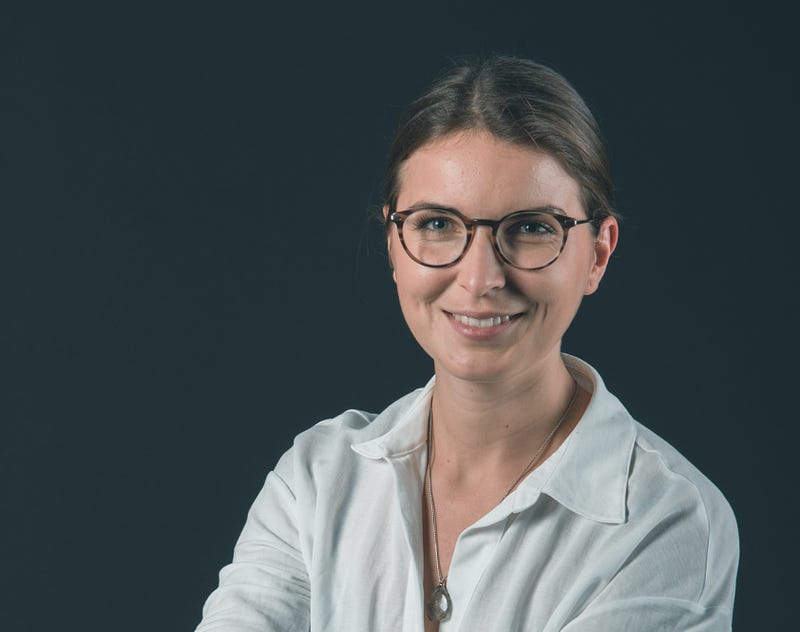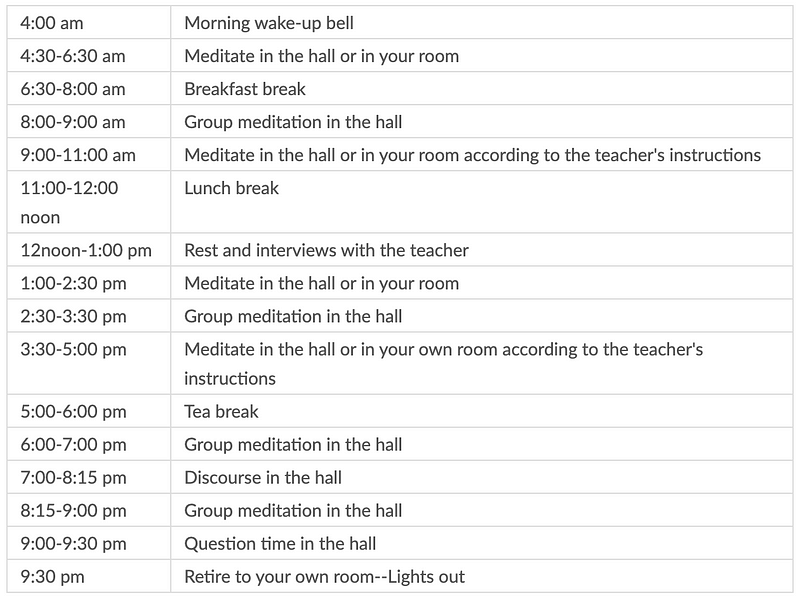“The most important thing is also the least sexy one.”
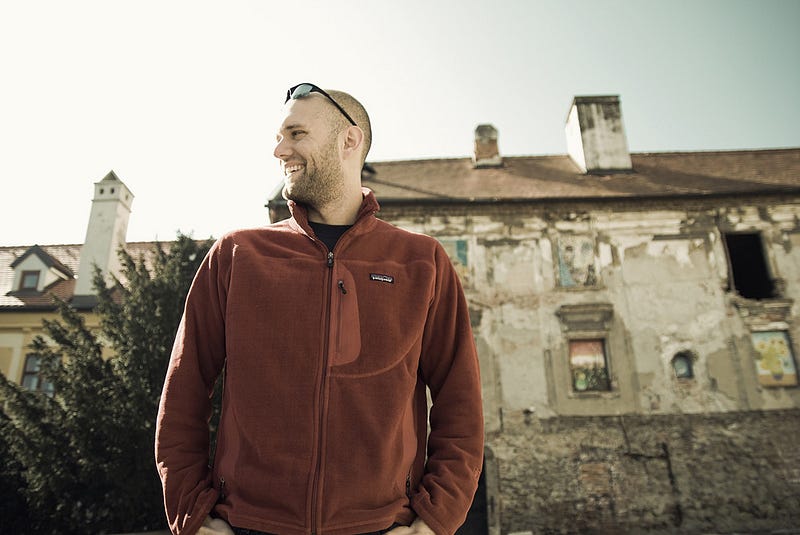
James Clear’s journey has not always been so clear as his name suggests.
I love his book. Others love it too. Atomic Habits has over 20,000 reviews on Audible and was translated into 40 languages. More than a million people subscribed to his newsletter.
I wanted to find out how he became a prolific writer. So I listened to around thirty of his guest interviews. Then, I went all the way down to internet time travel — a site that reveals website content from a decade ago.
His success is no coincidence. These are the habits that led him to write a book bought by one million people. You can steal them to write your own bestseller.
Iterating via Trial and Error
His website ‘jamesclear.com’ has been online for more than a decade. Within a decade, it underwent surprising turns.
In 2010, Clear announced ‘James Clear photography’. He sold his travel photos online and in print.
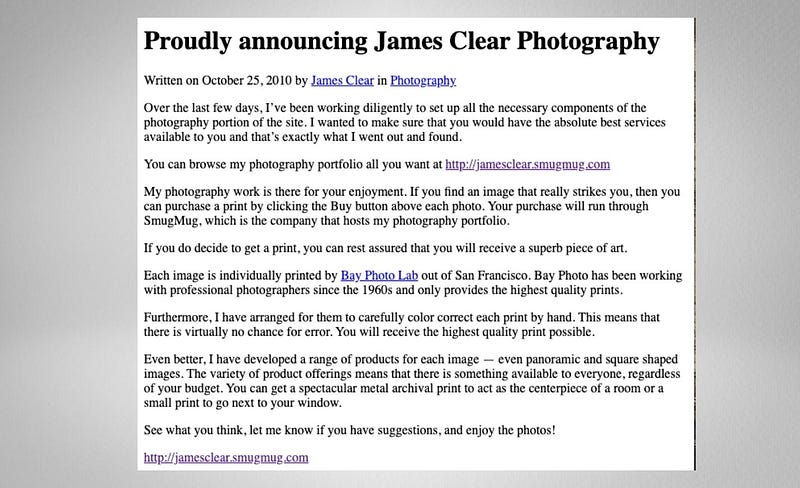
Maybe he didn’t get as many sales as he hoped to. Maybe he got bored.
So, Clear started something new. On December 13, 2010, he said:
“I am launching a new site that will become the centerpiece of my effort to build a business that I am proud of. The focus of the site will be on personal finance with an entrepreneurial twist.”
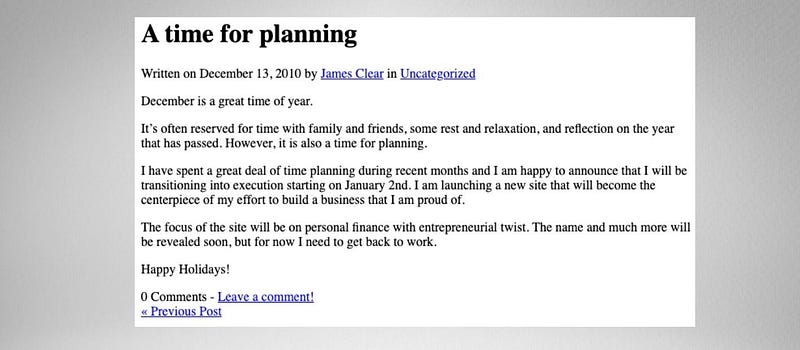
Three days later, he was done with planning. He announced to focus his self-employment on three main tasks:
- Creating mobile applications, including graphic design and user interface.
- Building niche websites on a topic he enjoys or a product he believes in.
- Selling travel photography.
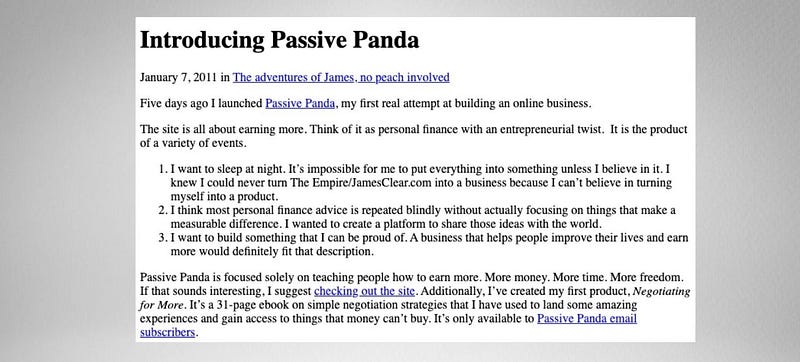
If you’d asked him in 2011 whether he’s planning to become a bestselling NYT author, his answer probably would’ve been a clear no.
It wasn’t until 2012 that his trajectory finally pointed towards the bestselling author he would later become.
Publishing Articles Twice a Week
In November 2012, James Clear launched a new website. He vowed to publish a new article every Monday and Thursday.
Even though he feared it was too late to start writing online, he kept that pace for the first three years. Reflecting on this first year of writing online, he writes:
“I wrote a new article every Monday and Thursday in 2013. (I only missed one day all year, which happened when I was sick with food poisoning while traveling through Italy).
My first article was published on November 12, 2012. I’m proud to say that since that time I have published 114 articles on JamesClear.com and received 686,937 unique visitors.”
His streak went on in 2014. In his annual review, he says:
“I’m proud to say that I stuck to this schedule without missing a post in 2014. I did take some time off during a planned sabbatical in June.”
2013 was also the first time he wrote about identity-based habits. Three years of writing online would go by until he was offered a book deal.

“The most important thing is also the least sexy one. I wrote two to three articles per week for three years, and I tried my best every time.” — James Clear
Following His Two Most Important Principles
While his business ideas iterated, he realized two core principles. In essence, it’s what still drives his continuous growth.
Discover what your audience wants
Early on in his entrepreneurial journey, he advised people who wanted to build a business.
“I’m about to let you in on an advanced technique that everyone should be using — and it’s really simple. Ask people what they want from you.
It is critical that you get to know the people that spend time on your site. Ask them what they want. Get to know their interests and needs. You will gain valuable insights about what you should be offering.”
He intuitively understood what Pat Flynn would later popularize as ‘Will it fly’ or Tucker Max as the ‘Target book audience’. You can copy his approach to learn more about your audience.
“Also, use open-ended questions that are proven to get responses. For example, a great question would go like this, “With respect to [your topic], what is the number one problem that I can help you with?”
When you start like James Clear — publishing on a blog, within a newsletter, or on Medium, you can build an audience before selling a book. You’re more likely to land a book deal and have an existing audience when you start selling your book.
Writing online before writing a book diminishes your risk. Instead of assuming what people want to read from you, the data shows you what works and what doesn’t. You get to know your audience without any sunk costs.
Writing online helps you discover the value you can bring to your audience before taking any money from them. Clear writes:
“I have readers emailing me each week asking when my book is coming out. I have friends telling me every month that I need to launch a product. Maybe it’s my own fears or mental barriers holding me back, but I haven’t done it yet. I want to do it. I plan to do it.”
Connect with your audience using email marketing
In a podcast interview, he explained that his email list went from 0 to 30,000 subscribers in the first year.
Eight years later, on Jan 5th, 2021, his list hit 1 million subscribers.
What did he do? He focused on connecting with his audience to truly understand their needs and build an email list from day one./media/e424a38d9f3b51c7b55549d26cde4674
Continuous Improvement for High Quality
Clear says it took him about a year to find his voice. He copied the style from various artists he admired. The longer he stuck with a writing habit, the more he developed his voice.
Even when he discovered his niche, he didn’t start writing a book. Instead, he continued improving his website.
He explains that the average article took him 20 hours to write. During his sabbatical, he reflected on how he could improve his writing. He added pictures to his articles and sources below every single one.
It’s this learner’s mindset he fostered all along.
“Picking what to read and making sure I’m reading consistently is a really important part of my writing and idea-generating process.” — James Clear
Final Thoughts
Success isn’t linear. James Clear could have stopped in 2010. He could have quit after his travel photography failed to take off. He could have quit after the demand for his financial freedom app didn’t materialize.
But he didn’t. He searched for his niche, produced consistently, and never stopped learning. And so can you.
Want to feel inspired and improve your learning?
Subscribe free to The Learn Letter. I read a book and 50 articles a week, and each Wednesday, you’ll receive the best in your inbox. This newsletter will make you find tools and resources that help you on your path to health, wealth, and wisdom.



